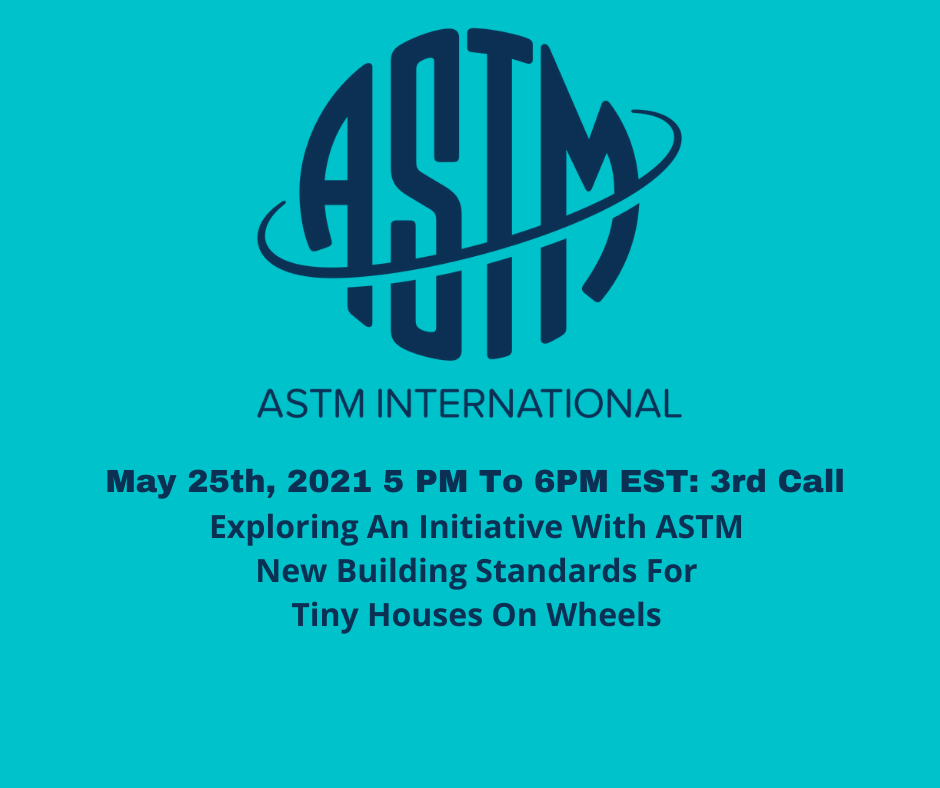May 25th, 2021 5pm EST
We have scheduled our 3rd call with ASTM to explore the initiative to write new Global Standards for tiny houses on wheels. ASTM is one of the largest standards developers in the world. ASTM has been accredited by ANSI and has been developing standards for 120 years. They have published over 13,000 standards.
150 Countries Can Participate
150 countries will have the ability to participate. At this time, we have stakeholders from the US, Canada, Australia, New Zealand, China and Italy participating.
ASTM Facilitates The Process And They Publish The Standards
In the simplest of terms, the stakeholders of an industry come together and write the standards utilizing the experts of their industry and ASTM facilitates the process to make sure it is cleansed from personal interest or leaning to the benefits of one company. The process can be completed within a 9 month to 18 month time frame.
May 25th, 2021 Call
The Agenda
Overview of Proposed Scope
This committee develops standards for tiny houses. Tiny houses on wheels will be the initial focus to write best building practices and minimum construction requirements for tiny houses on wheels, addressing all life, health, fire, road safety, incorporating seismic, thermal, wind, and roof load requirements and regulations, utilizing zone maps to address differing climates in geographical regions. The zones will be applicable to where the home is placed ( Not The Location Where It Is Built. Built ) The committee will define a tiny house on wheels and establish minimum requirements for manufacturing facilities.
Discussion Of Initial Standards
A. Performance Standard for tiny houses on wheels
B. Prescriptive Standards for tiny houses on wheels
C. Prescriptive Standards for tiny house trailers
D. Certification- Minimum requirements to include 3rd party agencies, auditing of the 3rd party agencies, possibly adopting ASTM E541 ( Requirements of personnel) Possibly reinstate ASTM E541.
Companion Standard: Foundation When Required
A foundation that could be removable such as tie downs, a Diamond Pier Foundation, Stopdigging Steel Ground Screws as suggestions, satisfying both DOT and a building department requirement if the jurisdiction requires a foundation for permanent living, allowing a tiny house on wheels to be mobile, permanent and to be mobile again for relocation purposes.
E. Removable Foundation Standard
Standard for Tiny House Communities
Establishing appropriate protocols to protect lives and property for tiny houses placed in clusters and communities with the possible referencing of NFPA 1194, NFPA 1144 and NFPA 501.
F. Standard for Tiny House Communities
G. Micro Grid for Utilities
Additional Purposes of The Committee
A. Perform additional functions that may advance, improve, standardize, and unify such standards, including implementing the standards in contracts, ordinances, legislation, and quality control manuals and building codes if needed.
B. Support jurisdictions, government officials, nonprofits, and various organizations through education.
Who Are The Stakeholders Supporting This Initiative
The stakeholders supporting this initiative are builders, DIYers, tiny house advocates, 3rd party inspection agencies, developers, lenders, city planners, appraisers, architects, engineers, affordable housing advocates and more.

Melanie Copeland Shares Her Support Of The ASTM Initiative
Melanie is lending her support toward the ASTM initiative from the perspective of an advocate that built her own tiny house on wheels with her husband and went from living under the radar to living legally in her tiny house on wheels as a dwelling on a lot she owns with the full support of the county she lives in.
Melanie Copeland is the secretary and the National Spokesperson for Tiny House Alliance USA.
Contact Janet Thome if you would like to be added on the stakeholders list and attend the call.
ja***@******************sa.org
Related
Tiny Houses On Wheels Barriers To Living Legally
A Global Dilemma: Is It A Building Or Is It A Vehicle?
Tiny Houses On Wheels-How many municipalities across the globe are asking the question ”Is A Tiny House On Wheels A Building Or A Vehicle?
There are numerous associations that have formed across the globe representing the stakeholders to implement change in legislation and zoning to legalize tiny houses to become a viable solution to housing. There are think tanks, affordable housing summits, festivals and meeting after meeting occurring, all with the goal to create more legal places to live.
At this time, there is not one unified industry standard that is recognized for tiny houses on wheels and each jurisdiction, bank, insurance agency, etc… could have a different definition and criteria to deny or allow them.
Tiny houses on wheels are most commonly built with RV and Park Model standards.
Part One: New Global Standard Tiny Houses On Wheels
Exploratory Initiative With ASTM
Today was the first meeting with ASTM ( American Society Of Testing Materials ) to explore an initiative to create a new long awaited Global Standard For Tiny Houses On Wheels. Janet Thome, the founder and President Of Tiny House Alliance USA is the proponent leading this initiative.
ASTM is one of the largest ANSI accredited international standards organization that develops and publishes voluntary consensus technical standards for a wide range of materials, products, systems, and services.
We have the potential to include 150 countries as stakeholders. We had representatives from the US, Canada, China and Australia.
Many countries are facing the same barriers for acceptance for tiny houses on wheels as a viable option for housing.
ASTM has relationships with all the governments of the world that will be invited to participate.
We had an exciting meeting that consisted of over 49 representatives of tiny house industry leaders, including manufacturers, DIYers, engineers, architects, the top five 3rd party, testing, inspection certification agencies in the world, NFPA, IBTS, an organization that audits third party agencies, appraisers, real estate developers and seven tiny house organizations.
Part Two: Why A Global Standard With ASTM?
150 Countries Have An Opportunity To Solve A Global Dilemma
Great real examples of ASTM committees that did not ot leave their international standards development to chance, nor did they delegate the recognition and acceptance of their standards to any force outside of the global marketplace. They debated long and hard about where to do their international work and about which process they would use to do it.
Their strategy was to place the world’s best technology and its standards investment where it was to be most quickly and efficiently updated and maintained, where international membership and input was individualized: ASTM International.

